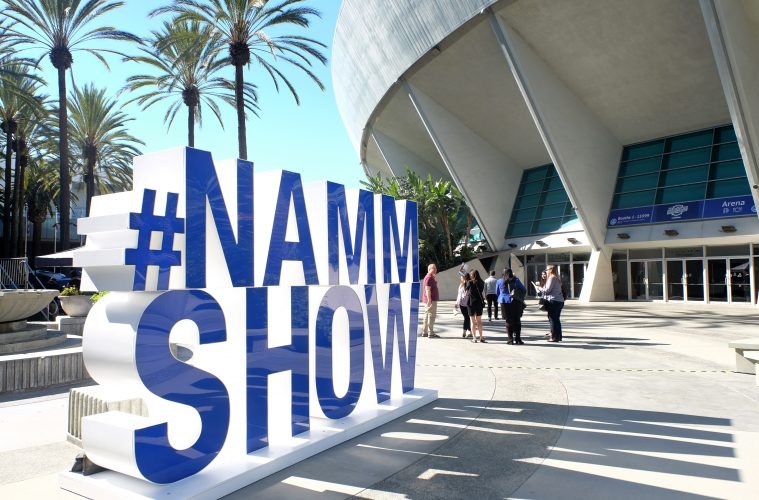By Amanda Mullen and Anthony Vargas
The NAMM Show is where the entire MI industry converges to show off its latest products and game changing innovations. In an industry like this one, with so many iconic legacy brands, it is often the biggest names that snag the majority of the post-NAMM press coverage. However, each NAMM Show also welcomes a number of first-time exhibitors to the show floor, and while these companies may not have the name recognition of the bigger brands, their products deserve just as much attention.
For this reason, each year the Music & Sound Retailer highlights a few standouts from the show’s roster of first-time exhibitors, as part of our NAMM Show coverage. We hope you enjoy learning more about these companies and their products.
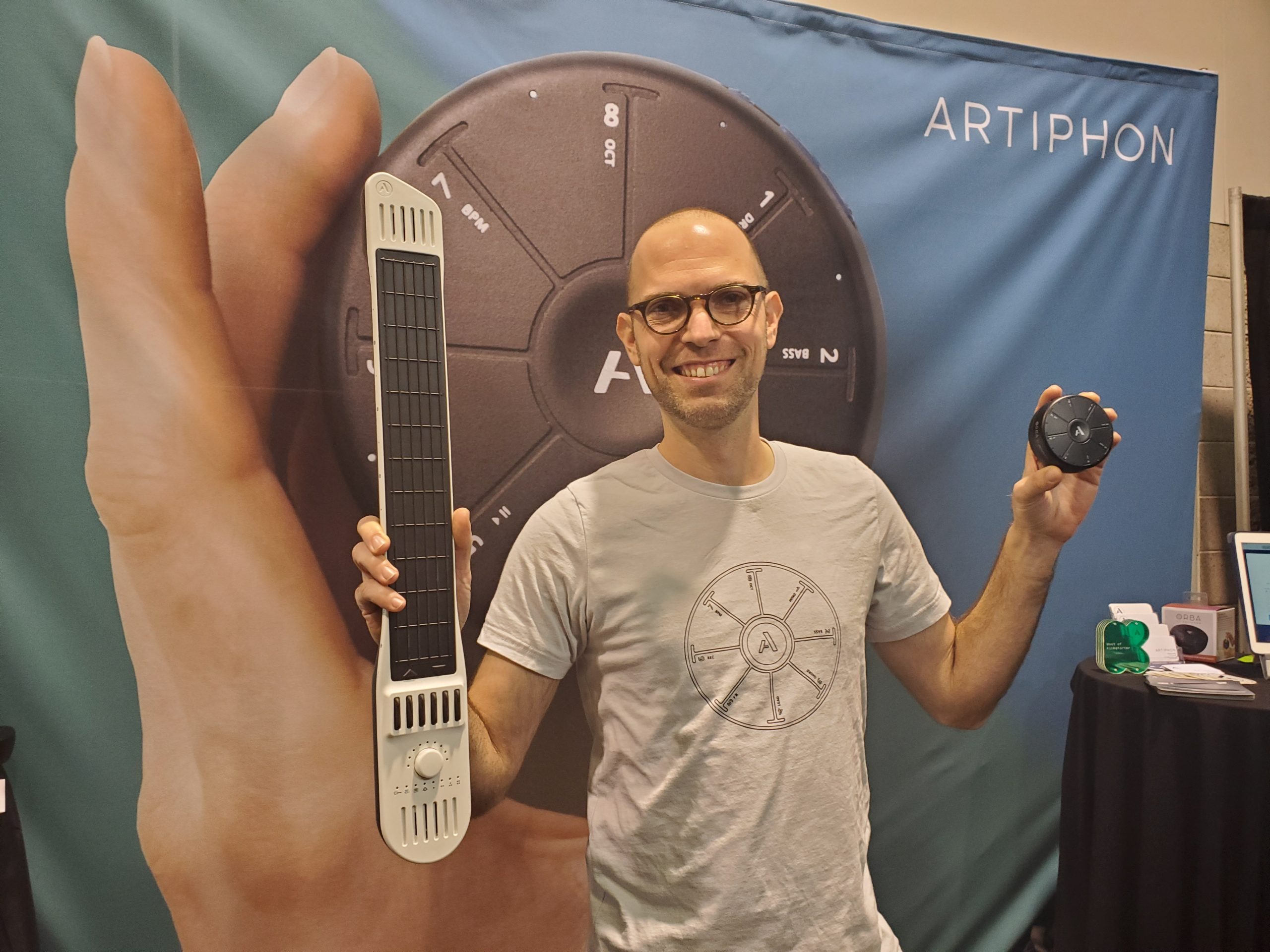
Mike Butera
Artiphon
artiphon.com
Artiphon stood out among The NAMM Show’s first-time exhibitors thanks to its innovative digital instruments. The company currently has two product offerings. The Instrument 1 is a MIDI controller than can be played like a guitar, violin, piano or drum, allowing musicians to incorporate a wide variety of playing techniques, from strumming and sliding to bowing and tapping. And the Orba, which was debuted to the MI industry at NAMM, is a handheld synth, looper and MIDI controller that lets users create music with gestures and button presses.
The company was founded by Mike Butera, who explained the philosophy behind his products. “We’re really focused on the majority of people who just want to be musically creative. And they might not call themselves musicians necessarily, but they enjoy making music on the side,” he said. “We do have a lot of pros playing our instruments because they’re fun. But unlike a lot of companies at NAMM, we’re really more focused on that consumer market.”
In order to ensure its products have as much universal appeal as possible, Artiphon designed them to be intuitive for kids and adults who may never have played an instrument before, as well as those who are already experienced musicians. Butera explained how this approach influenced the Orba’s design in particular. “We said, ‘What are the kids doing?’ They’re on their phones. They’re playing with gaming controllers. They’ve got amazing thumb dexterity. So let’s make an instrument that can really capture those micro-gestures that your thumbs can do, and have all the sounds built in so you can just have fun immediately,” he said. “So, yes, we designed it for the next generation. But what we’re finding, now that we’re launching it, is that everyone’s on their phones, [so] everyone can do this. And so it’s not necessarily about beginners only, because this is an advanced MPE MIDI controller that has 10 different outputs on MIDI CCs, and you can do them all at once. People are starting to use this and map it to their favorite synths. So it really can kind of grow with you as you explore more. But your first note is gonna be fun, too.”
Artiphon has already completed a successful Kickstarter program for the Orba, and both it and the Instrument 1 are ready for the MI market. “We just wrapped up the Kickstarter for Orba this past week, and we sold over 13,000 of these in the first month or so,” Butera said. “If any retailers are interested, they can reach out to us at sales@artiphon.com.”
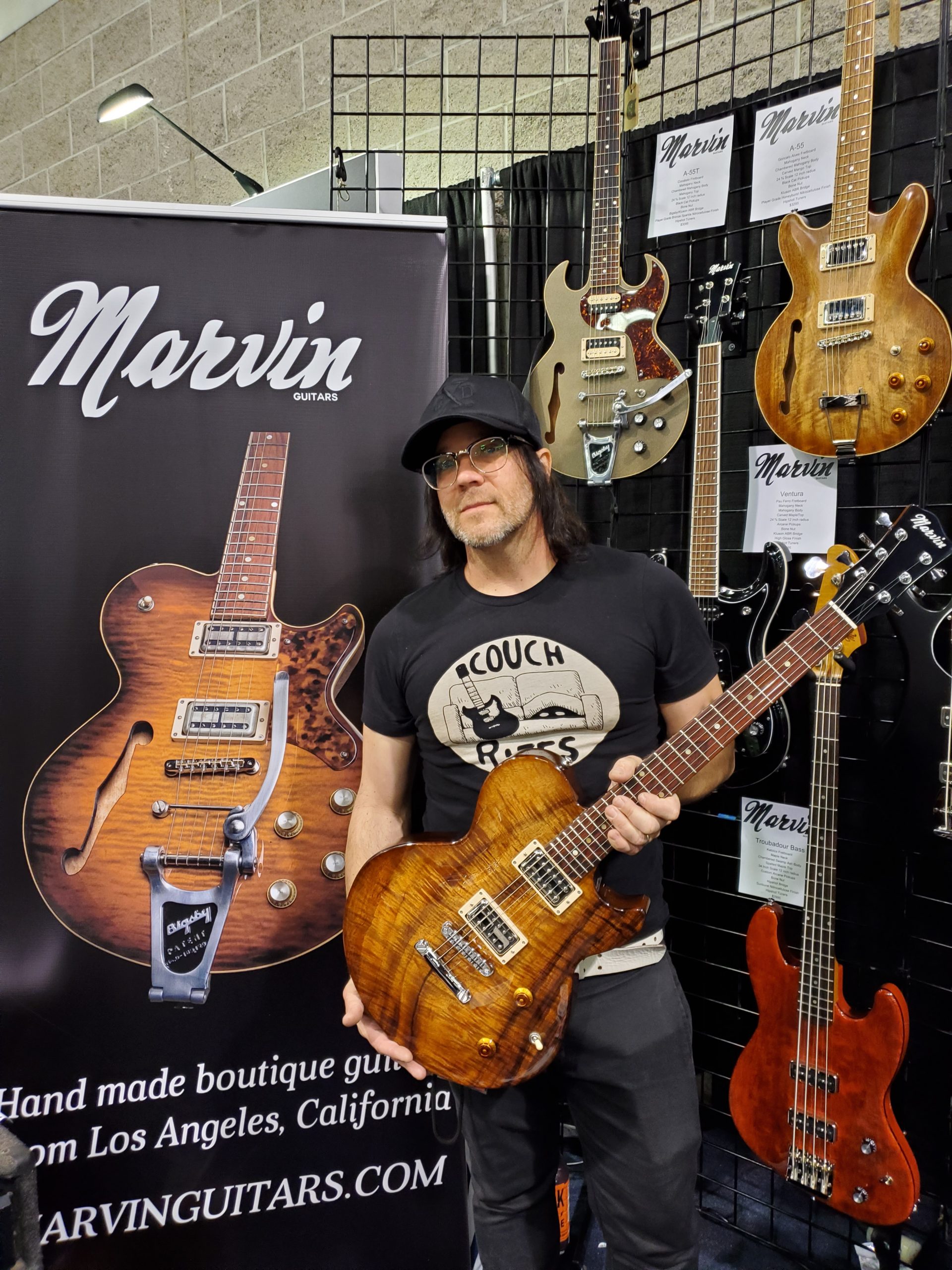
Keith Horne
Marvin Guitars
marvinguitars.com
Guitars are some of the flashier items NAMM Show attendees will see on the show floor, and that’s especially true of the handmade guitars out there. Marvin Guitars was one company exhibiting handmade guitars for the first time at this year’s show, and founder and builder Keith Horne handles just about every aspect of the business. Horne’s primary concern when building his instruments is quality, and he’s dedicated to ensuring musicians walk away with guitars that don’t just look great, but sound great as well. “I design, make, build, paint most of the stuff myself,” Horne explained. “[I use] the highest-quality components I can find, using small-batch builders for the components, as well as the pickups, the bridges, the tuners, everything. I try to use as many high-quality parts as possible and try to make the best-sounding and the best-looking instrument.”
At The NAMM Show, Marvin Guitars showcased guitars and basses, hoping to appeal to both types of players. “I don’t really do a lot of basses,” Horne said, “but I figure, you know, why not put a couple on the rack? Because there are bass players out there that are interested in handmade instruments.” Several variations of Horne’s Fillmore model were on display at the company’s booth, along with some of his older designs. Horne also expressed an interest in working with mom-and-pop shops to distribute his guitars, relaying that he already uses pieces from smaller, independent companies to build his lineup. “I do everything myself, so my business is me,” Horne explained. “I have no employees; it’s just me. So, I respect the fact that there’s people out there just hand-making stuff in small batches to the highest quality they can.” Horne added, “I use two different pickup makers, and they both hand-wind everything themselves. Same thing with the bridges that I use. They’re made by a small mom-and-pop company in Redding, Calif. They’re called Schroeder Guitar Hardware. For tuners, I use Hipshot Tuners, which is a small company out of New York. I just try to find people who are kind of doing the same thing that I’m doing, so that we can support each other.”
Anyone looking to support Marvin Guitars or simply learn more about the company can contact Horne through the form on the company’s website.
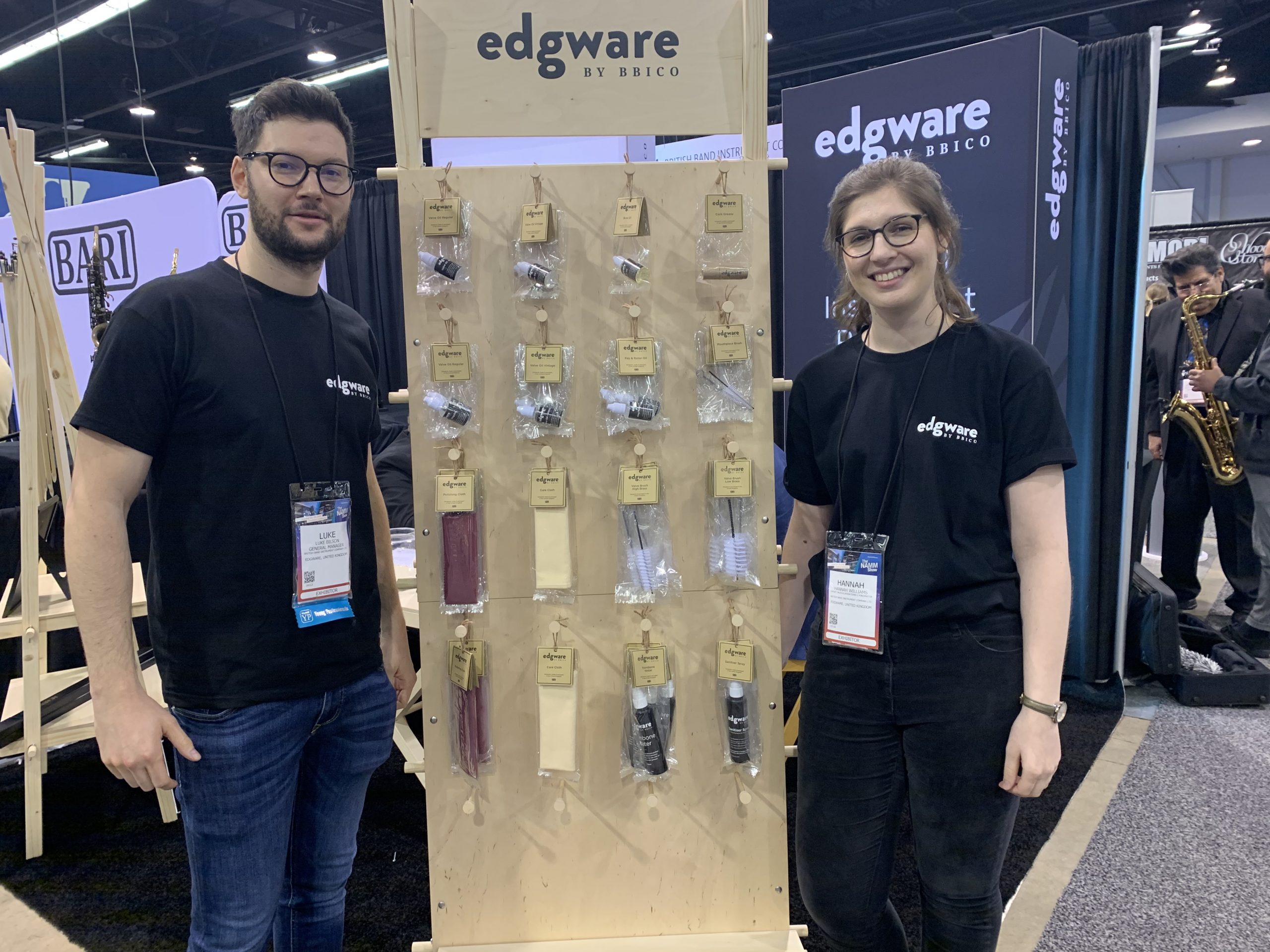
L to R: Luke Bilson and Hannah Williams
BBICO
bbico.com
The British Band Instrument Company (BBICO) stood out at its first NAMM Show through its collection of environmentally friendly products. The North London-based company, which was founded 10 years ago by Alun Hughes, launched its Academy and Edgware product lines at this year’s show, both of which are geared toward “the environmentally conscious musician.” The first brand, Academy, offers carbon-fiber bows for violinists. According to BBICO’s Luke Bilson, the bows are “aimed at the intermediate student market.”
“Carbon fiber is well priced for the dealer market,” Bilson explained. “We feel, especially in the USA, there’s a real keen opportunity for new string dealers. [The bows] are priced competitively for the U.S. market and priced to allow dealers a decent margin, but the consistency in quality of finish and material is excellent, and we’ve been having some really good feedback from U.K. dealers.”
According to BBICO’s Hannah Williams, the Edgware line of products includes “oils, greases, sprays, soaks, brushes and cloths,” all of which are created and packaged with sustainability in mind. “Although part of our packaging looks like plastic … it’s actually made from NatureFlex, which is wood pulp from managed plantations, and is fully compostable,” Williams explained. She also added that the product labels are “100-percent recyclable and made of recycled paper. To seal our packaging, we use a fully compostable twine, rather than any paperclips or staples. All components of our packaging are made in the U.K. It’s all fully recyclable and compostable. And all of our oils and lubricants are toxin-free, petroleum-free and synthetic-free. So they’re made from natural food-grade oils.”
Such products are ideal for children playing B&O instruments in school music programs, something Bilson and Williams touched on a bit while discussing the Edgware lineup. In particular, they highlighted the brand’s Sanitizer Spray, which unlike most cleaners, is completely toxin-free. “It doesn’t have toxins, petroleum and also is alcohol free,” Williams explained. “It contains hypochlorous acid, which is something that’s formed naturally in the body that fights germs and infections.”
“If you look on the market in the moment, a lot of sanitizer sprays do contain alcohol and lots of other nasty chemicals,” she added. “And if you think about you cleaning a mouthpiece with products containing these ingredients and then putting that mouthpiece in your mouth, it’s crazy to think about really, especially with young children.”
Overall, BBICO reported positive feedback from U.S. dealers at this year’s NAMM Show, especially considering it was the company’s first time exhibiting there. “We’ve been amazed by the feedback that we’ve received so far, not just on the packaging of our products, but also on the concept behind it,” Williams said. “And people have been really enthusiastic about getting behind it. And we’re looking forward to getting back to London and getting to work and getting some orders out.” U.S. dealers looking to work with BBICO can learn more about the company by emailing edgware@bbico.com or academy@bbico.com.
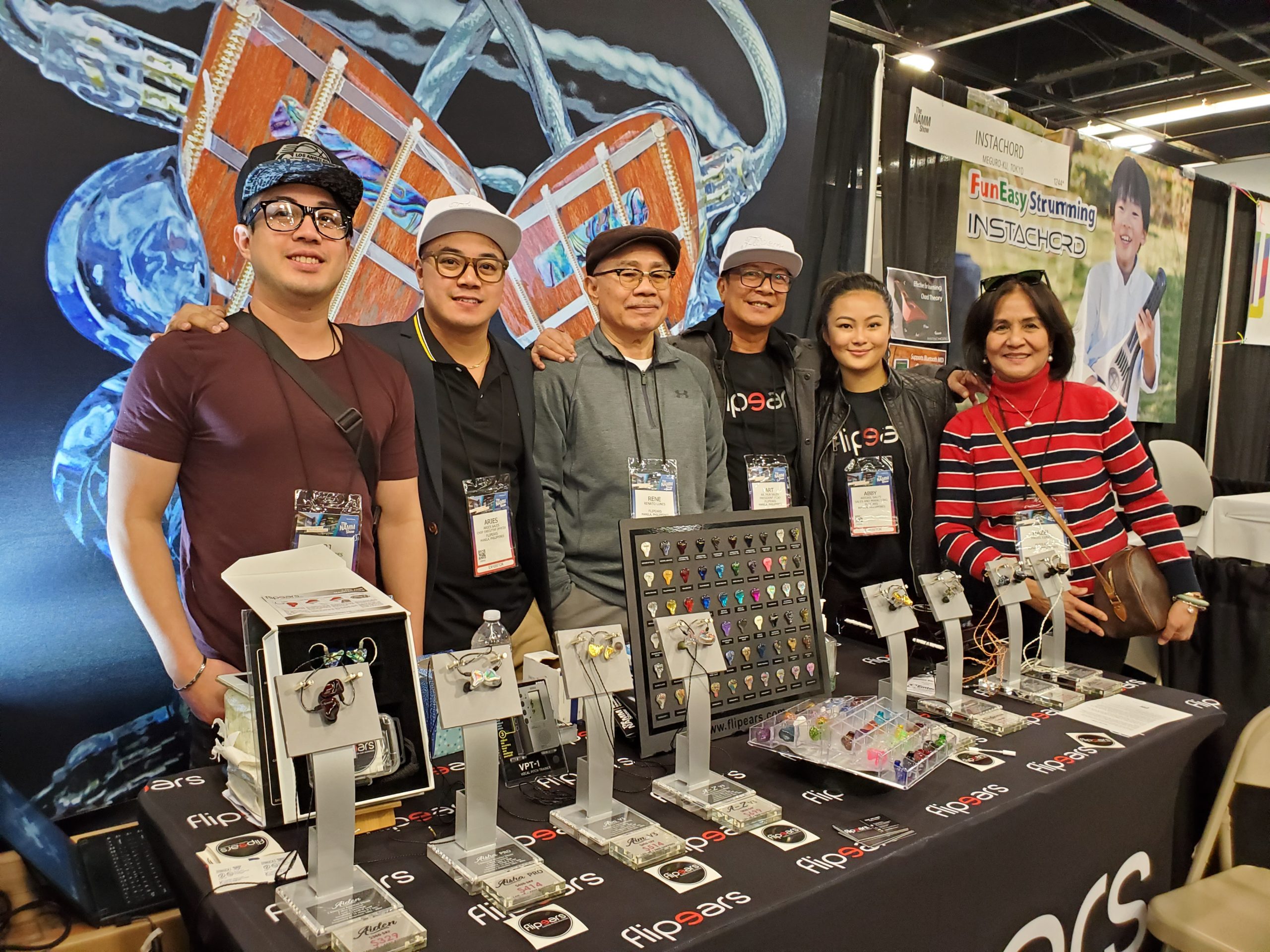
L to R: RJ Williams, Aries Sales, Rene Lunes, Art Sales, Abby Sales and Hazel Lunes
Flipears
flipears.com
In-ear monitors (IEMs) have made a major splash in the MI market in recent years, with many major audio manufacturers eager to get into the mix with their own IEM offerings. Also looking to capitalize on this opportunity is Philippines-based IEM manufacturer Flipears, which made its NAMM Show debut this year to claim its own slice of America’s burgeoning IEM market.
“We’ve been around for seven years. We started in the Philippines and expanded into Japan, Korea, Thailand, Taiwan, Malaysia and Indonesia. This is the first time we’ve ever touched the American market,” said Aries Sales, CEO of Flipears. “We’re made in the Philippines, assembled in the Philippines. But as we speak, we’re setting up a [facility] in Las Vegas for faster turnaround time and after-sales service [for the US market].”
Flipears already has an extensive line of custom and universal-fit IEMs available in a variety of configurations, from entry-level offerings to IEMs designed for discerning audiophiles. All of Flipears’ IEMs feature specialized drivers that are similar to the type used in hearing aids. Each tier of product packs a number of these miniature drivers in each monitor, from two drivers per ear all the way up to 16 per ear.
Sales gave the Retailer a rundown of some of Flipears’ product offerings. “The dual-driver model has two-way crossover, so there’s one speaker for the low frequency, and the other speaker for mids and highs,” he explained. “The next entry level we call the Aisha Pros, and that has one low, one mid and one high. Then the mid-tier models have six and eight drivers. The sixes have two lows, two mids and two highs, but the eights have four lows, so if you’re a basshead, if you love bass, that’s the way to go. Then the top of the line, which is an audiophile series, has 10 to 16 drivers, so it’s also good for producers, for mixing. The [16-driver model] has four bass drivers, six mids and six highs.” All Flipears IEM models are available in custom-fit or universal-fit varieties.
Flipears also offers an almost limitless array of customization options for its IEMs. “Users can customize their in-ears with different colors on the left and right, different faceplates on the left and right,” Sales described. “If you want your dog’s photo on your in-ears, yeah, we can do that. We’ve done wood faceplates. We even put guitar strings on the faceplate. Your imagination is the only limitation.”
According to Sales, Flipears is interested in having retailers sell its universal-fit models in their stores, and the company also has plans to work with US-based retailers on selling the custom models, as well. “For distributorship, we can give them a good margin that they can also mark up from. In Japan, we have five distributors already, and I hope we can do that here in America,” Sales said. “[For retailers who want to sell the custom models,] we can train them on doing the fitting. So that could actually be an extra source of income [for their stores,] because when you go to an ear expert who is trained to do ear impressions, it costs around $50 to $150. They can email us, and then they can visit us in Vegas where we’ll do the training.” Interested retailers can contact the company through its website or via email to orders@flipears.com.
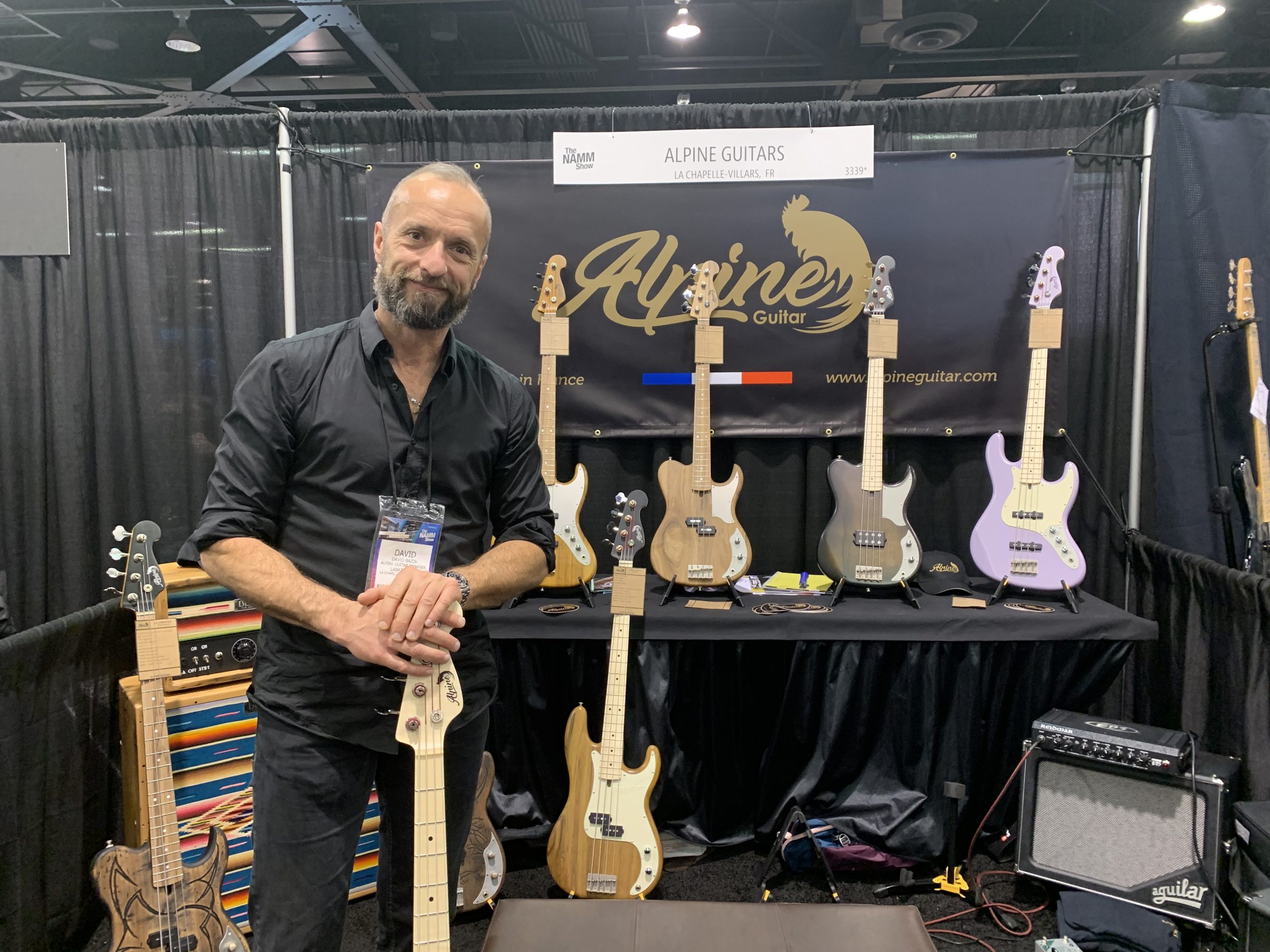
David Bazin
Alpine Guitars
alpineguitar.fr
Bass guitars are always a popular item on The NAMM Show floor, and Alpine Guitars came all the way from France to show off its collection of them. Run by David Bazin (co-leader), Matthieu Combe (head luthier) and Pierre Labrosse (leader), Alpine Guitars creates both limited-series and custommade basses, offering musicians something unique with each one. The company was founded four years ago, and it prides itself on making limited-series bass guitars with French wood exclusively.
“We use principally walnut because French walnut is not so heavy, like West walnut,” Bazin explained. “West walnut is a good wood, but very heavy, you know? And we use, too, French maple, French alder. The French maple is very white. It’s a very clear color. And in hardware, we use Hipshot USA, because it’s a very good company and very good material. And in pickups, we use Nordstrand Pickups.”
According to Bazin, Alpine Guitars’ first NAMM Show went well, with the company receiving interest from dealers on the show floor. “It’s a good show for us,” he said. “And next year, we’ll come back with pleasure, because we spoke with distributors, with shops, with our contacts, which is very good.” Anyone seeking further information on Alpine Guitars can contact the company through its website.
Wizzdrum
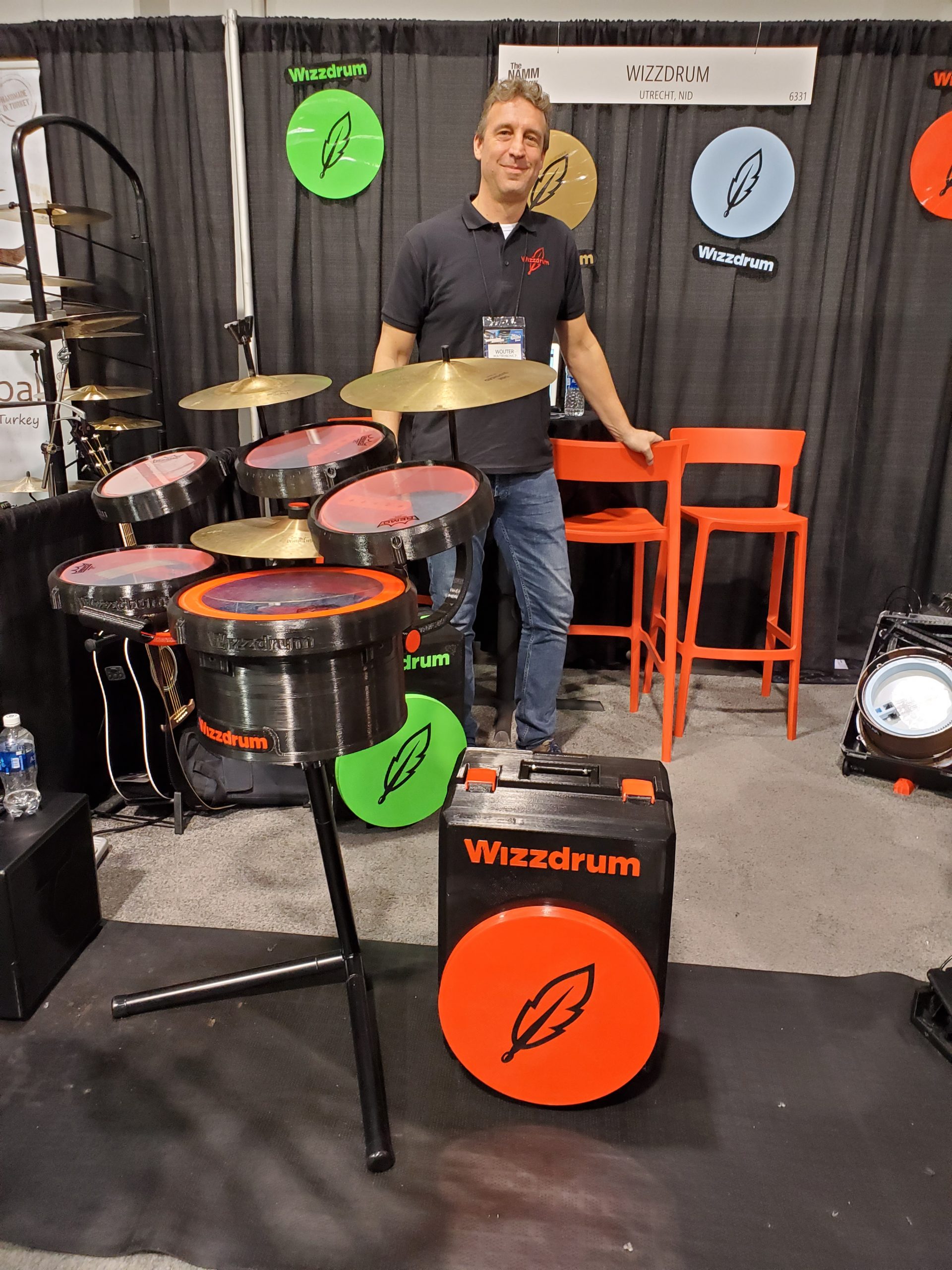
Wouter Hietkamp
wizzdrum.com
Wizzdrum is the brainchild of Dutch inventor Wouter Hietkamp, who wanted to take the idea of the portable drum kit to a whole new level. Each Wizzdrum kit fits inside a carrying case that’s about the same size as a typical rolling briefcase, so drummers can take their kits with them on the road, or even on a plane. And the kits are quiet enough to play in a hotel room, so drummers can still get some practice in on the road. Each of the drums is comprised of two rings with a drumhead placed in between. All of the sets are completely 3D printed.
The kits come in two sizes. The Wizzdrum Base Kit comes with a stand, a 13-inch bass drum, a 10-inch snare drum, a 10-inch tom, an eight-inch tom, two cymbal stands, a hi-hat manual system, a tuning key and a carrying case. The Wizzdrum Extended Kit comes with a stand, a 13-inch bass drum, a 10-inch snare drum, two 10-inch toms, an eight-inch tom, a hi-hat foot pedal, a bass drum foot pedal, two cymbal stands, a hi-hat manual system, a tuning key and a carrying case. Neither of the sets come with cymbals, so drummers will have to provide their own; however, both sets have room for cymbals in their carrying cases.
According to Hietkamp, drummers will find a lot to like about the portability and comparatively low volume of the Wizzdrum sets. “Drum sets are pretty loud, and they’re heavy and bulky. And for every drummer, it’s the same problem: Guys in the band always complaining about the level of sound. So I wanted to change that,” Hietkamp explained. “This kit is very lightweight. It has a great sound. Tuning is really easy. And you can set it up in like five minutes from a box.”
Hietkamp added that the Wizzdrum kits are especially suited for drummers who play certain styles of music, or who play in smaller venues, or on cramped stages. “There are some styles which are more suitable than others, like funk, or when you’re playing in the street,” he said. “Small venues — it’s excellent for that. If you play big rock concerts, I would suggest you get a double bass drum and the biggest set you can find. But for all the others, I think this is the most suitable kit that you can find. It has a very low sound level. So if you want to play acoustically with like a guitar or a piano, you don’t have to amplify the other instruments.”
Hietkamp welcomed retailers to reach out if they are interested in stocking some Wizzdrum sets. “If there are distributors or large retailers [who are interested], they can always contact us through our website, and we can see if we can make a deal,” he said.
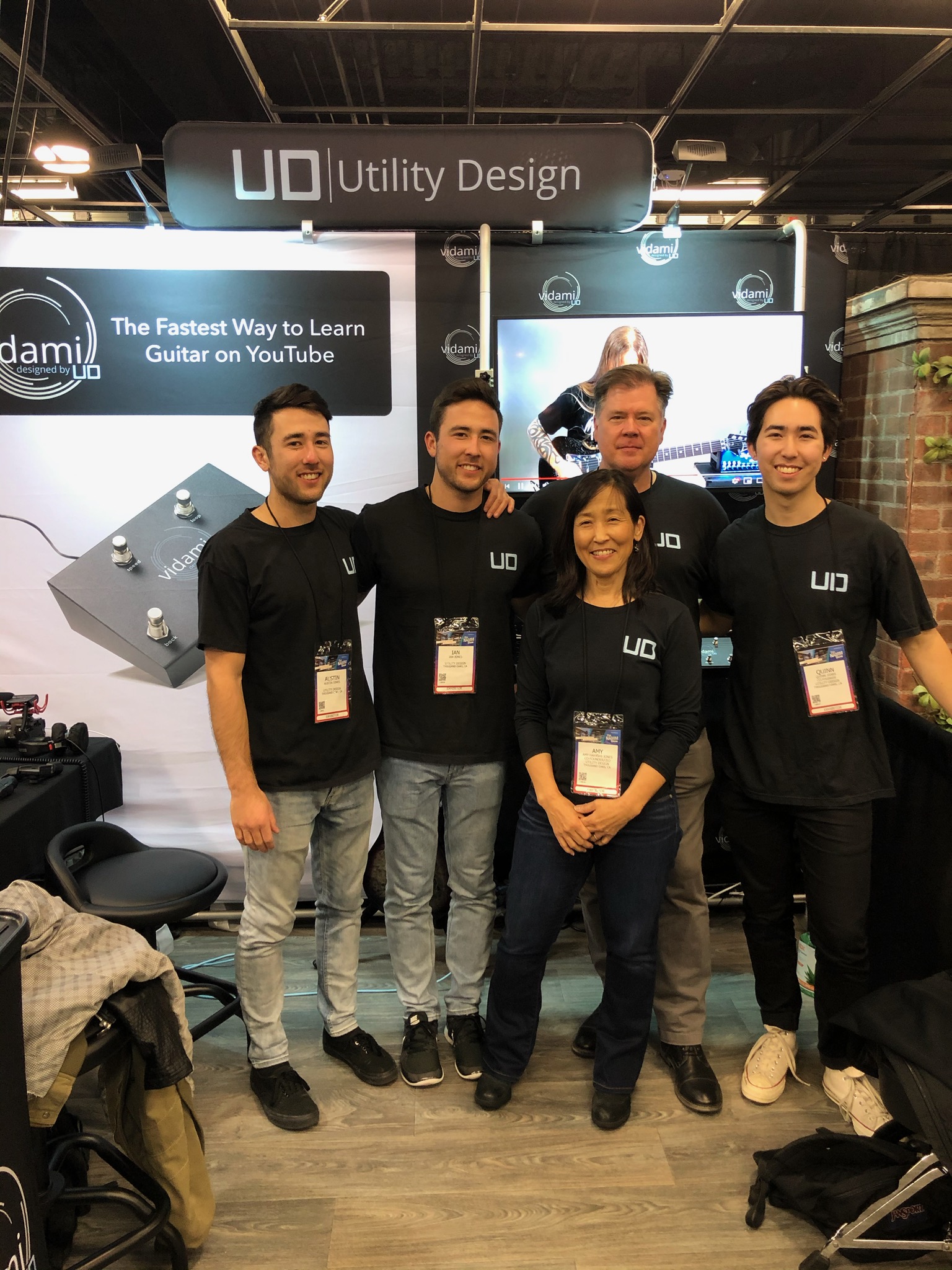
L to R: Austin Jones, Ian Jones, Wayne Jones, Amy Hayashi-Jones and Quinn Jones
Utility Design
utility.design
Utility Design (UD) is a family-run music-tech startup whose premiere product, the Vidami foot controller, enables users to loop any section of a video while slowing it down, making learning an instrument online easier than ever before. The Vidami’s hands-free design also controls play/pause, rewind and fast-forward functions, which allows musicians to maximize their focus and productivity by keeping their hands on their instruments, with no need to reach for a mouse or keyboard.
According to UD CEO Amy Hayashi-Jones, the company sees the Vidami pedal as an indispensable learning tool for players of all levels — especially guitarists — since players are increasingly inspired by YouTube videos and are using them to supplement their music lessons, and more and more music teachers are going online to teach. “I think it’s going to change the learning curve for musicians and become a hugely beneficial aid to both students and teachers,” Hayashi-Jones said. “For instance, if you are new to an instrument, just the ability to easily pause and rewind the video without taking your hands out of position is incredibly helpful. Add to this the ability to loop any section and slow it down to multiple speeds, and you have a learning tool that can benefit musicians of any level. Transcribing solos and songs is faster than ever before. The Vidami allows you to personalize your practice to be able to focus on what you want to work on, making learning online motivating and inspiring.”
With time at a premium and attention spans growing shorter and shorter, UD believes that the Vidami will allow players to stay focused longer, which will allow beginning guitarists to make it past that difficult first year of learning. “Fender has stated that 90% of beginning guitarists quit within the first year. That means that 9 out of 10 beginners are quitting within the first twelve months. That’s an alarming statistic, and UD believes that this pedal has the ability to turn that figure around,” Hayashi-Jones said. “If we can make that figure 8 out of 10, we will double the customer lifetime value for guitar retailers.” She added, “At UD, we are designing products to bridge the gap between the user and technology, and that is why we believe that the Vidami is a product whose time has arrived!”
You can learn more about Vidami and UD at the company’s website, utility.design. Retailers who are interested in stockIng the Vidami pedal can contact Amy Hayashi-Jones directly at amy@utility.design.
To read more features from the Music & Sound Retailer, click here.


